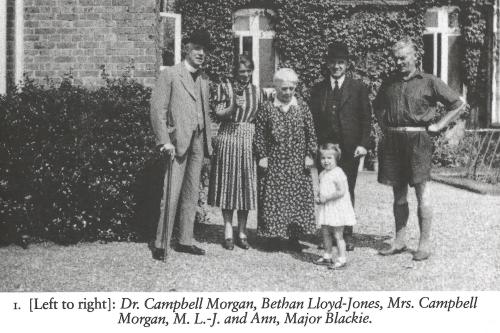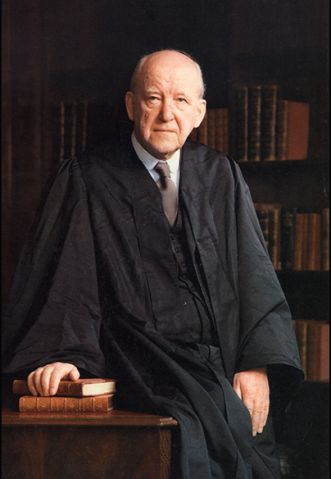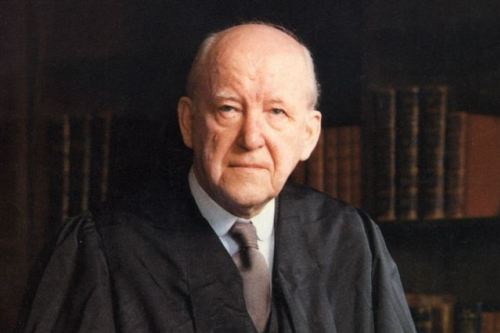In the last Century, David Martyn Lloyd-Jones was looked upon by many as one of the most influential Christians of the modern era. Though not an Author in the proper sense, his books, transcribed from his sermons, became some of the best sellers available at the time. If you’ve never heard of him, or just know of him, take a few minutes to become familiar with this man by reading the following Article.
Editor’s Note: The following Article appears courtesy of “Dictionary of Welsh Biography” (https://biography.wales/article/s12-LLOY-MAR-1899 ) written by Dafydd Ifans (pictures courtesy of Banner of Truth’s Fight Of Faith). Having read Iain Murray’s 2 Volume set on Lloyd-Jones, I found this to be a great summary of his life and wanted to include something more than just a Wikipedia Article. Much of the Biographical Content of this Website is at the behest of other’s work. The only credit I take is finding it to be a good and concise work and putting it in as a Post. My hope is that it helps make their “Contributions” to the website helpful!
His reputation as a preacher spread far and wide and there followed many invitations for him to preach throughout Wales at midweek meetings. During the summer of 1932, he received his first invitation to preach abroad and he spent July and August that year ministering to a church in Toronto, Canada. The leaders of the Methodist Connection back home, however, were not so supportive, labelling him a ‘fundamentalist’, and when an attempt was made to appoint him Principal of Bala Theological College, the appointment was blocked by the denomination. On another occasion, attempts were made to appoint him leader of the Forward Movement, a position later held by his brother-in-law, the Rev. Ieuan Phillips.


‘The Dr’, as he was called by his later followers, ministered at Sandfields for eleven years before receiving an invitation in 1938 to be co-pastor with the Rev. G. Campbell Morgan at Westminster Chapel, Buckingham Gate, London. This arrangement carried on throughout the Blitz years until Campbell Morgan retired in 1943.
In contrast to his predecessor who preached from an Arminian position, Dr Lloyd-Jones was a Calvinist and belonged to the reformed wing of the theological spectrum. He began to preach several series of sermons on New Testament books, twice on Sunday and also at a meeting held on Friday evenings. He would preach verse by verse, sometimes just taking part of a verse per sermon. He spent two years preaching on the Sermon on the Mount (Matthew 5-7) and the series was published in two volumes: Studies in the Sermon on the Mount (1959 and 1966); he preached 384 sermons on Paul’s Letter to the Romans and they appeared in 14 volumes: Romans (between 1970 and 2003); while eight volumes on Paul’s Letter to the Ephesians, based on a series of 260 sermons appeared as Ephesians (between 1974 and 1982).
By the end of the Second World War, Westminster Chapel would be full to capacity with about two thousand worshippers every Sunday. All sorts of listeners flocked to hear the ministry: students, professional people, the London-Welsh, doctors and nurses, people of all ages and denominations, and some with no church or chapel affiliation. He had a gift for teaching basic doctrines of the Christian faith by reasoning and persuading his listeners, with very little use of illustration. As one contemporary member of the congregation explained: ‘he touched the mind, the soul and the life’ of his hearers. Following both Sunday services, Dr Lloyd-Jones would welcome individals to his room at the chapel to discuss problems and receive pastoral advice.
This fruitful ministry continued until his retirement in 1968, partly because of illness, but primarily in order to edit his sermons for publication. Close on a hundred books and pamphlets have appeared in print to date, of which many have been translated into foreign languages from Korean in the east to Brazilian Portuguese in the west. His sermons are available online on the MLJ Trust website, and this accounts for the fact that people worldwide are still able to appreciate his ministry.

Dr Lloyd-Jones became the foremost leader of Nonconformist evangelicalism in the British Isles and ministers and individuals would turn to him for counsel. In addition to his duties at Westminster Chapel, he was involved with a number of bodies which furthered the same reformed position as he held, and he served on many of their committees. Among these were: the body which served evangelical students, the IVF; IFES, the international evangelical student body of which he served as president; the Evangelical Library which had been established in London; the Medical Christian Movement, in fact his interest in medical matters was lifelong and he read medical journals regularly; the Puritan/Westminster Conference; the Banner of Truth publishing house; and the London Theological Seminary.

Between 1948 and his last illness in 1980, Dr Lloyd-Jones played a prominent part with the Evangelical Movement of Wales. He was acknowledged as its leader in Welsh-language circles as well as the English-language side of its work. An annual ministers’ conference was held at Bryn-y-groes, Y Bala, one of the residential centres owned by the Movement, and ‘the Dr’ was always the main speaker at the end of each conference.
His greatest Welsh heroes were Howel Harris, Daniel Rowland and William Williams Pantycelyn. For him, Williams’s hymns were a powerful combination of biblical theology and the lived experience of the believer. His English hero was George Whitefield, while he acknowledged Jonathan Edwards as the interpreter of the eighteenth-century revival in America. He was extremely interested in the phenomenon of ‘revival’ and he managed to transfer the longing for seeing God returning in a mighty way to many of his followers. He preached in America more than once and the fruit of one such visit is his influential volume Preaching and Preachers (1971).
Although he remained on the books of the Presbyterian Church of Wales as a preacher until his death, he came to believe that the true biblical church was a group of believers who chose to have fellowship with each other within an independent congregation. During his address to the Evangelical Alliance in October 1966, he appealed to evangelical Christians to come together in churches where God’s Word would be venerated and would be preached under the blessing of the Holy Spirit. This address caused great agitation within evangelical circles at the time. The Chairman of the meeting, the eminent Anglican John Stott, intervened by criticizing Dr Lloyd-Jones’s position, and much discussion and disagreement ensued for many years, with a split developing between those who chose to leave their denominations and those who chose to remain within them.
Martyn Lloyd-Jones died on St David’s Day 1981. His funeral was held at Bethel Chapel (CM), Newcastle Emlyn and it was estimated that there were 900 people present. His body was laid to rest in Gelli Cemetery on the outskirts of the town. He was survived by his widow and two daughters, Lady Elizabeth Catherwood (b. 1927) and Mrs Ann Beatt (b. 1937). During his lifetime he refused to receive honorary doctorates; he also refused a CBE in 1977.
One of his many biographers says of him: ‘His strength as a debater was fearful at times’. Although he was renowned for preaching with authority, he could be very gentle when advising individuals. Several people have argued that he made use of his medical diagnostic skills when dealing with the souls of troubled men and women in a wise, insightful way. One of his most influential books in this field was Spiritual Depression : its causes and cures (1964).
Martyn Lloyd-Jones is regarded as one of the greatest preachers of the twentieth century. His sermons, preserved in books and recordings, have an abiding influence today. As a result, this warm-hearted Welshman is held in high esteem among Christians in countries all over the world.
